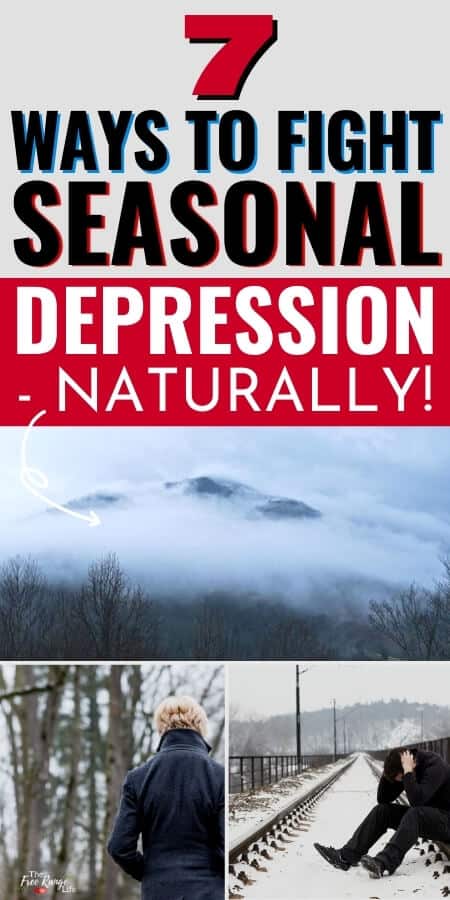Do you suffer from Seasonal Affective Disorder or depression? Here are 7 ways to naturally fight and easy seasonal depression symptoms!
The days are slowly getting shorter. I see it when we rush out to feed the animals after dinner- trying to beat the sunset.
This site contains affiliate links. If you make a purchase using one of these links, I may earn a commission. Please see my disclosure page for more information about cookies collected and our privacy policy.
I see it as the morning light comes later and later. And I can feel it coming. I feel the changes in myself that signal the reduced exposure to daylight.
Seasonal Depression. Or Seasonal Affective Disorder.
I think it is common for many people to have the winter blahs.
It’s dark. It’s cold. It’s gray and brown.
But seasonal depression (and depression in general) goes deeper than feeling blue and unmotivated.
It’s feeling depressed or sad, often all day, everyday. For no reason at all.
It’s waking up feeling like a 1000 lb weight is literally crushing your chest.
It’s being unable to go to sleep or stay asleep. Or sleeping all night and still being so tired you can’t move.
It’s losing interest in things that you usually love.
It’s a deep, crushing, feeling inside that you just can’t shake.
I have suffered from both anxiety and depression almost my entire life.
It’s a struggle I know I will never completely be free of, but during the warmer, sunnier, more colorful months, I can plow through it.
Many of these things I am going to mention I use year round, but in the fall and winter months I add in extra supports to fight the heavy fog that comes with Seasonal Affective Disorder.
How to Fight Seasonal Depression Naturally
I have been on anti-depressants on and off over the years. I have always hated them and only go back when I really need them- like for postpartum depression.
I prefer to take the natural route whenever possible and I often find that I feel better using these methods than when on the pharmaceuticals anyway.
Here are some of the things I have used over the year to naturally easy SAD symptoms in the winter months.
5 HTP:
I started using this supplement a couple of years ago after refusing to go back to Prozac or Zoloft. I was actually pretty surprised by how good I felt on it. I had tried St. John’s Wort with lackluster results, but 5-HTP really helped. I was being productive again. I could feel the pressure lifting off my chest and I even started writing again (and wrote and published a novel!)
What is it? Simply put it’s an amino acid that helps your body manufacture serotonin and melatonin. I won’t get all technical, but you can read more about 5-HTP on Herbwisdom.
I take this year round, but often have to up my dose in the fall and winter months. I use NOW brand 5 HTP with great results- starting with the lowest does and upping it as needed.
Methyl Folate:
B vitamins are super important your your health and over the years I’ve done a lot of reading on the role vitamins (and deficiencies) play in depression.
Most of the time B Complex is recommended, but after doing some reading on depression, folate, and the MTHFR mutation, I decided to add a biologically active form of Methyl Folate to my diet.
This particular supplement also helps the 5-HTP work better. I personally use Jarrow Formulas Methyl Folate.
Related Reading: 9 Essential Oils for Emotional Health and Stress
Vitamin D:
Most of the body’s Vitamin D is made through sun exposure, so it makes sense that in the winter months when sun exposure is limited that it can drop to lower than needed levels.
It is also virtually impossible to eat enough foods to make an ample amount of Vitamin D.
Adding in a Vitamin D supplement can help combat all the symptoms caused by a deficiency (and yes, mood disorders are a symptom).
Diet
Diet is linked to so many things. We all know that we should limit our intake of unhealthy, processed foods. That we shouldn’t eat foods that are full of white sugar or corn syrup or whatnot. It can be a hard balance, especially since food is often used to self-medicate.
I find in the months of seasonal depression I have to work harder at keeping this balance. And it doesn’t help that these months are also filled with all of our “food” holidays!
A pint of ice cream might be a nice band-aid but a clean, healthy diet will be more of a cure and help you feel healthy and less depressed.
Get Outside
In the warmer months we live outside. I am in the garden, visiting the livestock, or just enjoying my family in our yard. In the cooler months I have to force myself to get out there. Getting outside will expose you to the sun and force you to get out of your head and enjoy the day.
It may be cold. And gray.
You may be tired. Or exhausted. Or overwhelmed.
But I guarantee if you get outside and get that fresh air and sunshine and search for the beauty that comes with nature in the fall and winter you will be happier for it.
Get Moving
And when you are outside- Get moving! The worst thing to do when you are feeling depressed is to do nothing.
Depression gets a bad name. We often get told to get over it or just be happy. And while that is horrible advice given by people who don’t really understand, there is a tiny bit of truth in there.
You may feel too tired and, well, depressed to go to the gym. Or go out with your friends. Or take your kids to the park. Or take a walk. But you know what? If you just do it. If you force yourself to get up, slap on a fake smile, and get moving. You will feel better.
Your smile will eventually not be fake and you will truly be enjoying your walk, your friends, and your kids. And that high will filter in to the rest of your day and you will be more productive and less weighed down.
Related Reading: 12 Amazing Benefits of Chamomile Tea
Light Therapy
This is one I have actually never tried, but plan to this year.
Our home is in a valley and with the mountains directly behind and in front of us, our days seem even shorter. The higher elevation also brings in a lot of fog which can make the days very sad and gray.
There has been a lot of research on the affects of Light Therapy, blue light, in particular, and I think it’s worth a try to see it’s effectiveness.
I would love to hear if you have any other suggestions or ways that you combat seasonal depression. Comment below if you have something to add or a story to tell!




Four years ago with the winter pregnancy of my fifth baby I was basically in bed the whole time. My body was so over burdened and out of gas. I totally changed my already clean diet to an Auto Immune Protocol and started using the supplements you mentioned[but from a different company :) ]. I can’t take 5-HTP though because I am loony on it, lol.
I still do all of the above but it wasn’t until last year when I started actively balancing my blood sugars and building my gut flora with a enzyme rich probiotic that I did not suffer from SAD, for the first time in 25 years! Considering that 90% of serotonin is produced in your gut, I can see why actively building my gut flora has made such a huge difference. Serotonin meets up with DHA [added a omega high in SDA] in the pineal gland in the brain and manufactures melatonin so I can now sleep all night long and wake up refreshed. I also found a vitamin that is aloe based so the nutrients are absorbed and used at a higher rate.
I still have days that are slow but not the majority of them anymore. I have an eight foot full spectrum custom made light that sits over my farm table. We sit and do school for at least three hours weekday mornings.
My final move to combat SAD is moving south, which is in the works. Northern MN doesn’t do one any favors when it comes to sunshine and warmth!
I am so glad that you have found ways to combat SAD.
I have my D checked via blood work twice a year and take what I need for a supplement from mid-October-ish until mid-spring. Having a high tunnel to spend time in during the winter has been a huge help. I also take B Complex daily and B-12 once a week. B’s are being shown to help delay and/or lesson dementia later in life. I know I am definitely more alert year round now.
I hadn’t heard of 5 HTP and will look into it more now. Thanks for telling us about it.